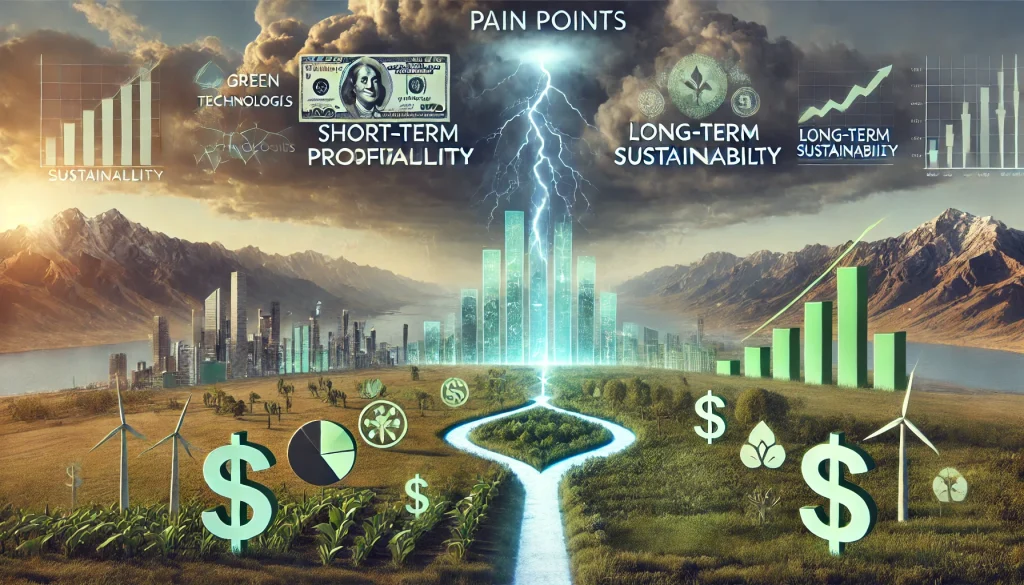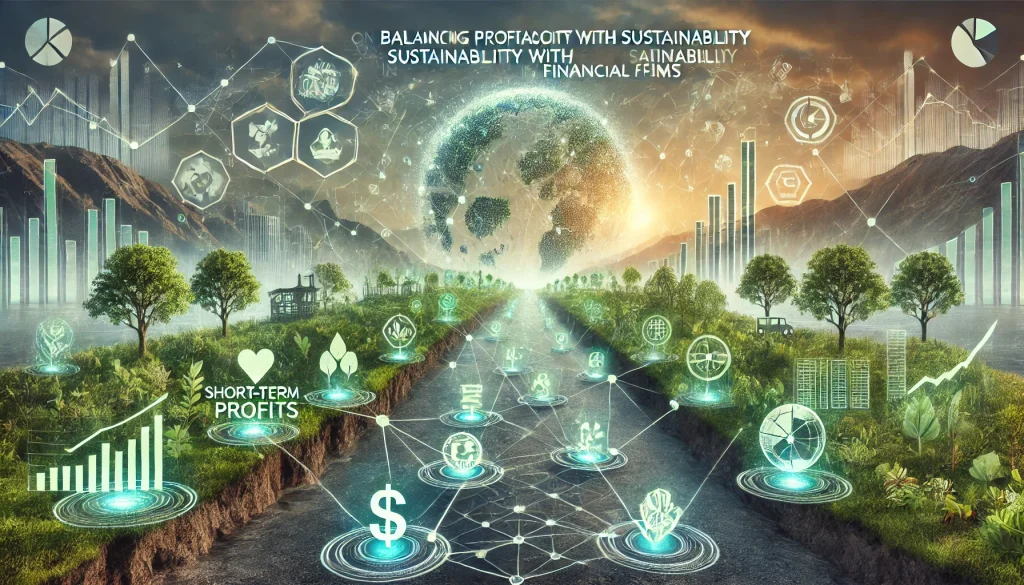Problem Statement :
Financial firms are under constant pressure to deliver short-term profitability, driven by shareholder expectations, market competition, and quarterly financial reporting. However, this focus on immediate financial gains can sometimes be at odds with long-term sustainability goals, particularly in areas such as environmental responsibility. Investments in green technologies, renewable energy, or sustainable business practices often require significant upfront costs and may not yield immediate financial returns. This creates a conflict for financial firms, as they must navigate the delicate balance between meeting short-term financial targets and investing in long-term initiatives that contribute to broader environmental and social goals.
The challenge is further compounded by the increasing demand from stakeholders—including customers, investors, and regulators—for firms to demonstrate their commitment to sustainability. Failure to address these expectations can lead to reputational risks, loss of customer trust, and missed opportunities in emerging markets that prioritize sustainability. On the other hand, firms that prioritize short-term gains at the expense of long-term sustainability may find themselves ill-equipped to navigate the growing risks associated with climate change, resource depletion, and shifting regulatory landscapes.
To succeed in this complex environment, financial firms must develop strategies that align short-term profitability with long-term sustainability. This requires a holistic approach that integrates environmental, social, and governance (ESG) considerations into business decisions, investment strategies, and risk management practices. By doing so, firms can not only achieve their financial goals but also contribute to a more sustainable and equitable future, building resilience and creating value for all stakeholders.
Pain Points:
- Conflict Between Short-Term and Long-Term Goals: Difficulty in balancing the need for immediate financial returns with long-term sustainability investments.
- Upfront Costs of Sustainability: High initial costs associated with green technologies and sustainable practices.
- Pressure from Shareholders: Shareholders often prioritize short-term profits over long-term environmental goals.
- Reputational Risk: Failure to prioritize sustainability can damage a firm’s reputation and lead to a loss of customer trust.
- Regulatory Uncertainty: Navigating a complex and evolving regulatory landscape related to environmental and social responsibility.
- Market Volatility: Short-term market fluctuations can make it challenging to commit to long-term sustainability investments.
- Data and Reporting Challenges: Difficulty in measuring and reporting on sustainability metrics that align with financial performance.
- Changing Consumer Preferences: Increasing demand for sustainable products and services that may not align with traditional profit models.
- Operational Risks: Potential disruptions from climate change, resource scarcity, and other environmental factors.
- Investment Horizon Mismatch: Aligning the longer time horizons needed for sustainability investments with the shorter time horizons of traditional financial metrics.

Future Vision:
The future for financial firms lies in successfully integrating sustainability into their core business strategies, ensuring that profitability and environmental responsibility are not seen as mutually exclusive. This will involve a shift towards more sustainable investment portfolios, where firms allocate capital to projects and technologies that contribute to environmental and social well-being. Financial institutions will increasingly adopt ESG frameworks, using them to guide decision-making, manage risks, and create long-term value for stakeholders.
Innovative financial products, such as green bonds, sustainability-linked loans, and impact investing funds, will become more prominent as firms seek to align their offerings with the growing demand for sustainable investments. These products will not only cater to environmentally conscious investors but will also serve as a tool for firms to meet their own sustainability targets while generating returns.
In addition, advancements in technology will play a crucial role in enhancing sustainability efforts. AI and big data analytics will enable more accurate measurement and reporting of sustainability metrics, allowing firms to track progress and demonstrate their impact to stakeholders. Blockchain technology may also be leveraged to ensure transparency and traceability in sustainable supply chains and investments.
Moreover, firms will need to foster a culture of sustainability within their organizations, where employees are encouraged to think long-term and consider the environmental and social implications of their actions. This cultural shift, supported by leadership commitment and transparent communication, will be essential in embedding sustainability into the fabric of the organization.
Ultimately, the goal is to create a financial system where short-term profitability and long-term sustainability are mutually reinforcing. By embracing this holistic approach, financial firms can not only achieve their financial objectives but also contribute to a more sustainable and resilient global economy.
Use Cases:
- Green Bonds: Issuing bonds specifically to fund environmentally friendly projects, such as renewable energy or energy efficiency improvements.
- Sustainability-Linked Loans: Offering loans with interest rates tied to the borrower’s achievement of specific sustainability targets.
- Impact Investing: Investing in companies or projects that generate measurable environmental or social impacts alongside financial returns.
- ESG Integration in Portfolios: Incorporating ESG criteria into investment analysis and decision-making processes to identify sustainable opportunities.
- Carbon Credit Financing: Providing financing for projects that generate carbon credits, helping firms offset their carbon footprints.
- Sustainable Supply Chain Financing: Offering financing solutions that incentivize sustainable practices within supply chains.
- Green Infrastructure Investment: Funding the development of sustainable infrastructure, such as smart grids or public transportation systems.
- Environmental Risk Management: Implementing risk management strategies that account for environmental risks, such as climate change or resource scarcity.
- Stakeholder Engagement Programs: Developing initiatives that engage stakeholders on sustainability issues, aligning business practices with their expectations.
- Sustainability Reporting Tools: Creating tools that help firms measure, track, and report on their sustainability performance.
Target Users and Stakeholders:
- Target Users:
- Institutional Investors: Age 30-70, both genders, seeking sustainable investment opportunities that align with their values and long-term goals.
- Corporate Executives: Age 35-65, both genders, responsible for balancing profitability with sustainability within their organizations.
- ESG Analysts: Age 25-55, both genders, focused on integrating environmental, social, and governance factors into investment decisions.
- Stakeholders:
- Shareholders: Interested in both financial returns and the long-term sustainability of the companies they invest in.
- Regulators: Ensuring that financial firms comply with environmental and social responsibility regulations.
- Customers: Seeking financial products and services that align with their values and sustainability goals.
- Employees: Looking for a company culture that prioritizes sustainability and long-term thinking.
- Community and Environmental Groups: Advocating for sustainable practices and responsible corporate behavior.
Key Competition:
- BlackRock: A leader in ESG investing, committed to integrating sustainability into its investment decisions and portfolio management.
- Goldman Sachs: Focuses on sustainable finance, offering products and services that support environmental and social goals.
- J.P. Morgan: Provides sustainability-linked loans and green bonds, aiming to drive positive environmental impact through its financial offerings.
- Morgan Stanley: Offers impact investing and sustainable finance solutions, integrating ESG factors into its wealth management services.
- HSBC: Committed to supporting the transition to a low-carbon economy through its green finance initiatives and sustainability programs.
Products/Services:
- BlackRock Sustainable ETFs: Exchange-traded funds focused on companies with strong ESG performance.
- Goldman Sachs Green Bonds: Bonds issued to finance projects with positive environmental impacts.
- J.P. Morgan ESG Integration: Incorporating ESG factors into investment analysis across various asset classes.
- Morgan Stanley Impact Investing: Investment products that generate financial returns alongside measurable social and environmental impact.
- HSBC Sustainability-Linked Loans: Loans tied to the borrower’s achievement of sustainability targets, incentivizing positive environmental behavior.
Active Startups:
- Aspiration: A financial firm offering sustainable banking and investment products aimed at reducing carbon footprints and supporting green initiatives.
- Betterment: Provides socially responsible investing portfolios that align with ESG principles.
- Ethic: A tech-driven asset management platform that creates customized sustainable portfolios for institutional investors.
- Clim8: Focuses on impact investing, providing a platform for investments in companies addressing climate change.
- OpenInvest: Offers customizable, ESG-aligned portfolios that allow investors to focus on sustainability and social responsibility.
Ongoing Work in Related Areas:
- Sustainable Finance Innovation: Developing new financial products, such as green bonds and sustainability-linked loans, that align profitability with environmental goals.
- ESG Data Analytics: Enhancing data analytics tools to measure and report on sustainability performance and ESG metrics.
- Impact Measurement Frameworks: Creating frameworks that quantify the social and environmental impact of investments.
- Blockchain for Transparency: Leveraging blockchain technology to enhance transparency and traceability in sustainable investments.
- Climate Risk Assessment Tools: Developing tools to assess and manage climate-related risks in investment portfolios.
- Sustainability Reporting Standards: Advancing global standards for sustainability reporting to ensure consistency and comparability across firms.
- Green Technology Financing: Providing financial solutions to support the development and deployment of green technologies.
- Corporate Sustainability Training: Offering training programs that educate employees on sustainability and ESG principles.
- Circular Economy Financing: Funding business models that promote the circular economy, reducing waste and resource consumption.
- Sustainable Supply Chain Financing: Supporting sustainable practices within supply chains through targeted financing solutions.
Recent Investment:
- Aspiration: Raised $135 million in Series C funding in May 2021, led by Alpha Edison, to expand its sustainable banking and investment platform.
- Betterment: Secured $160 million in Series F funding in September 2021, led by Kinnevik, to grow its socially responsible investing offerings.
- Ethic: Raised $29 million in Series B funding in July 2021, led by Oak HC/FT, to scale its sustainable asset management platform.
- Clim8: Secured $10 million in Series A funding in March 2021, led by 7percent Ventures, to expand its impact investing platform.
- OpenInvest: Acquired by J.P. Morgan in July 2021, focusing on expanding ESG-aligned portfolio offerings through the integration of sustainability principles.
Market Maturity:
The market for sustainable finance is rapidly maturing as both investors and financial firms recognize the importance of aligning profitability with environmental and social responsibility. The growing demand for ESG-aligned products, coupled with regulatory pressures and shifting consumer preferences, has driven significant innovation in this space. Established financial institutions and emerging startups are increasingly offering products and services that cater to the needs of sustainability-focused investors. As technology advances, the ability to measure, report, and manage sustainability performance will further accelerate the adoption of sustainable finance practices, making this a dynamic and evolving market.
Summary :
Financial firms face the complex challenge of balancing short-term profitability with long-term sustainability goals, particularly in areas such as environmental responsibility. The pressure to deliver immediate financial returns can sometimes conflict with the need to invest in green technologies, renewable energy, and sustainable practices, which often require significant upfront costs and may not yield immediate financial benefits. This conflict is compounded by increasing stakeholder demands for firms to demonstrate their commitment to sustainability, as well as the growing risks associated with climate change and resource depletion.
To navigate this challenge, financial firms must develop strategies that align short-term profitability with long-term sustainability. This involves integrating ESG considerations into business decisions, investment strategies, and risk management practices. Innovative financial products, such as green bonds, sustainability-linked loans, and impact investing funds, can help firms achieve their financial objectives while contributing to broader environmental and social goals. Additionally, advancements in technology, such as AI, big data analytics, and blockchain, will play a crucial role in enhancing sustainability efforts by enabling more accurate measurement, reporting, and transparency.
By embracing this holistic approach, financial firms can create a financial system where profitability and sustainability are mutually reinforcing, ensuring that they not only meet their short-term financial targets but also contribute to a more sustainable and resilient global economy.



